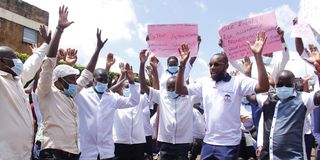Nurses ought to re-brand the profession now

Meru nurses protest in Meru town. The nurses were denied access to health facilities where they work after they resumed following a court order.
What you need to know:
- Healthcare workers’ industrial action should not supersede patient care.
- An honest re-evaluation of the role of the Kenyan nurse is timely.
That ‘nurses are the backbone of healthcare’ is a statement that has been repeated many times, as if it comes straight from the Holy Mountain.
It has, however, not helped much with the amplification of the role of the nurse and midwife. The World Health Organization (WHO) even extended the celebration of nurses and midwives from 2020 to 2021.
Despite the challenges of the Covid-19 pandemic and the resultant claps and half-hearted ululations for healthcare workers, the world has quickly moved on.
The bravado accompanying the strike by Kenya National Union of Nurses (Knun) to agitate for better terms is contrasted by the whimpers and blank stares that characterised its calling off.
There was a concerted effort from the government to address nurses’ woes. Kenyans heralded the call for improved remuneration and risk allowance. There seemed to be white smoke until there was none. But Knun adopted a hard-line approach.
Patient care
Healthcare workers’ industrial action should not supersede patient care. It must be aimed at resolution of the differences and tempering pressures for the workers. This strike offered a chance for the Knun leadership to showcase the role of the nurse, capitalising on the pandemic.
But we were treated to half-coherent screams and threats which, sadly, failed to capture the spirit of the profession.
Industrial action may be protected by international labour laws but employers reserve the right to give in to demands or not to. The same Salaries and Remuneration Commission (SRC) that declared the country too broke to cater for the nurses’ demands found enough funds to give MCAs car grants. That’s a sign for a change of strategy.
An honest re-evaluation of the role of the Kenyan nurse is timely. Contrary to common belief, nurses are not under the chaperonage of medical doctors. Nursing is an autonomous profession guided by evidence-based practice and a rich body of theoretical foundation. Nurses assess, investigate and interpret clinical and non-clinical data to arrive at a diagnosis geared towards full health and wellbeing.
Go the extra mile
Nurses go the extra mile of caring not only for the patient but the family and community at large. Caring is not a character trait found in every human being. It is even more tasking when you have to learn how to care for others at their worst as part of your job.
Probably, this led the WHO to have “Nursing the World Back to Health” as the theme for the Year of the Nurse and Midwife 2020-2021.
Nurses must be strong enough to eliminate the misconception that only doctors understand complex pathologies and physiologies. Let them show us what they have and do it with a touch of class.
Doing this has the dual effect of raising the standards of nursing and attracting more students to the profession. If we are to meet the WHO-recommended nurse-to-patient ratio of 1:5, then we must train and register as many nurses as possible.
[email protected]. @Catemimi1772





